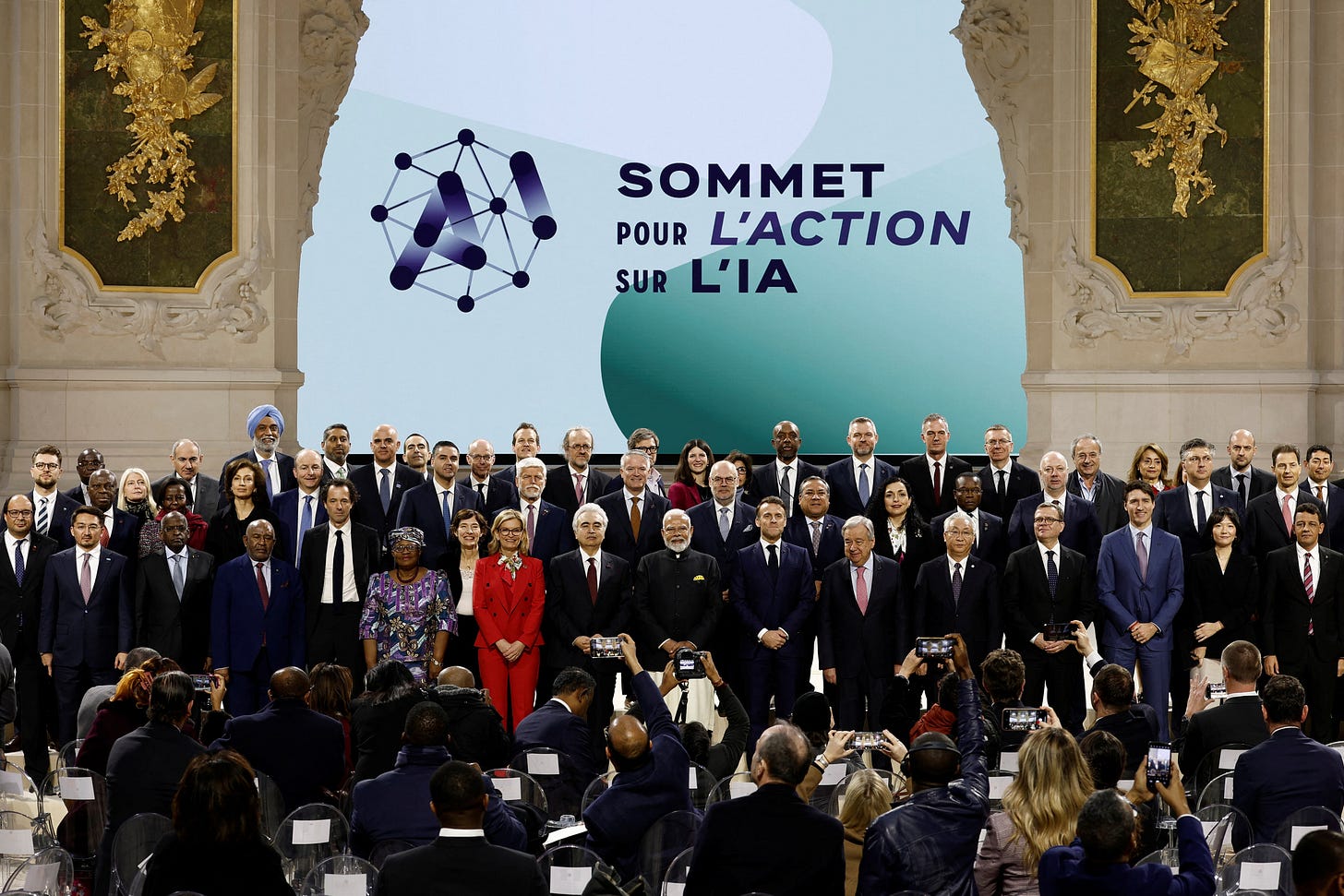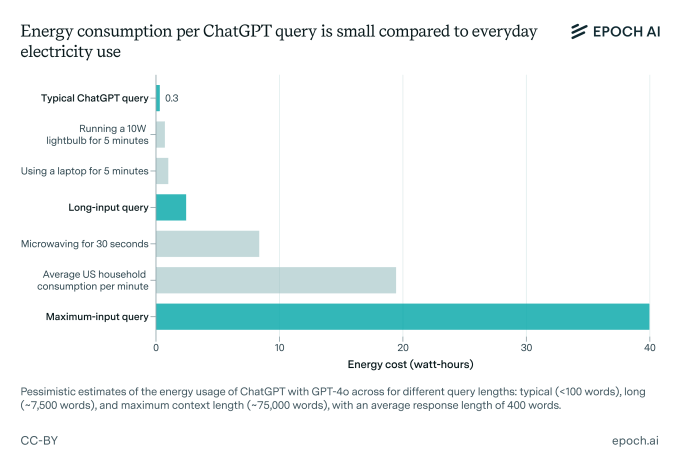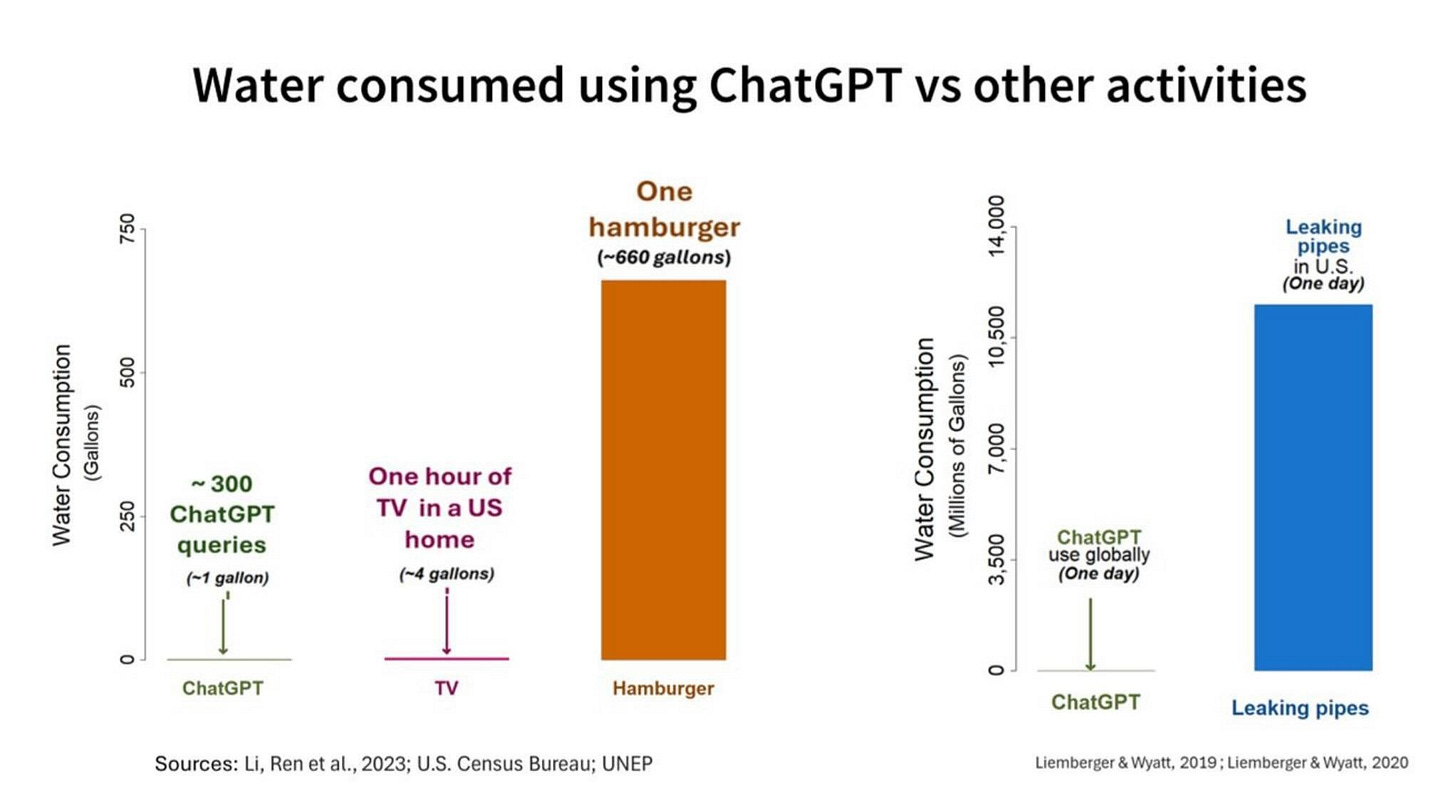A week in Generative AI: GPT-4.5, AI Action Summit & The Environment
News for the week ending 16th February 2025
Phew! Big week this week, and not just because there were some big news items, but also because there was some great research and analysis published on generative AI’s environmental impact and lots of long reads!
The major headlines of the week were Sam Altman’s tweet announcing a huge roadmap update for OpenAI and the Paris AI Action Summit. There were three great pieces of research/analysis on the environment from Hugging Face, who launched their AI Energy Score Ratings, EpochAI, and Andy Masley. We also got OpenAI’s first ever ad at the Super Bowl and a nice little dancing robot to finish things off.
In ethics news, a report showed how ChatGPT’s political views are shifting right, Anthropic released their Economic Index, and the BBC released some research showing how AI chatbots are unable to accurately summaries the news.
There are also lots of great long reads this week, with an opinion piece from Sam Altman, a TED talk from OpenAI’s Noam Brown, and if you’re interested in how much of an impact AI is already having on science and research I highly recommend Veritasium’s video documenting whether the world’s biggest problems have the same solution.
OpenAI update their product roadmap
In one small tweet this week, Sam Altman shared more on OpenAI’s product roadmap than they have done in their near 10-year history. The launch of GPT-4.5 is very close, likely to arrive by the end of the month. GPT-4.5 will be the last non-chain-of-thought model (large chat model) that they release with GPT-5 being a unification of their o3 large reasoning model (which will now not be released separately) with a large chat model and many of OpenAI’s other technologies.
GPT-5 is likely to release in the next couple of months - I would guess April/May time and will be available to everyone, including the free tier. This will be an incredibly powerful model and will include features such as advanced voice mode, canvas, search, deep research and more. I think this will be a big game changer and I’m very excited to see what it’s like when it’s launched. If it is a similar step change from GPT-4 to that which we saw from GPT-3, then GPT-5 will be incredibly impressive.
Before all of this is launched, we’ve already seen an updated GPT-4o model this week that now jointly tops the Chatbot Arena leaderboard. Many people are praising the new GPT-4o model saying that it is much more “human”, better at writing (and notably, seen as better than Claude), and better at following instructions like style guides.
Paris hosts the AI Action Summit
This week Paris hosted the third global AI summit after the one at Bletchley Park in November 2023, and the one in Seoul in May 2024. There’s some great coverage of everything over at TechCrunch’s France AI Action Summit Hub.
The three big themes that came out of the summit were around:
A huge increase in investment in AI infrastructure in Europe, with the EU announcing plans for “AI Gigafactories“ with $200b in combined public-private investment.
An increasingly clear divide between US and European approaches to AI regulation with the US and UK refusing to sign the summit’s joint declaration that focused on “ensuring AI is open, inclusive, transparent, ethical, safe, secure, and trustworthy“.
More public funding for AI initiatives to counterbalance private investments and ensure there is more support for smaller AI companies and open-source development.
There were lots of other things discussed at the Summit, and below are some of the headlines that came out from it this week:
Macron unveils $112B AI investment package, France’s answer to US’ Stargate
US and UK refuse to sign Paris summit declaration on ‘inclusive’ AI
Macron urges Europe to simplify its regulations to get back into the AI race
In Paris, JD Vance skewers EU AI rules, lauds US tech supremacy
Generative AI’s impact on the environment
There have been three interesting news stories this week around the impact that generative AI technologies are having on the environment. All three of these stories focus on the impact of using the models, and do not cover the impact of training the models.
The first is from Hugging Face who have announced AI Energy Score Ratings. This is a fantastic initiative to try and add some sorely needed transparency to the energy consumption of a wide variety of AI models. Hugging Face have created a standardise energy rating for AI models based on their energy consumption during specific tasks. They have also published a public leaderboard of AI models and a portal for AI developers to submit their models for benchmarking. There are currently 32 models in the leaderboard including ones from Meta, Microsoft, Google, Mistral, Cohere, and Hugging Face themselves. Interestingly they’ve classified models into three classes - models that can run on a single consumer GPU (like a laptop), models that can run on a single cloud GPU, and models that run on multiple cloud GPUs. The least efficient model on the text generation leaderboard consumes 61,848x more energy than the most efficient at the time of writing 🤯.
The second interesting story was from some recent analysis by EpochAI that attempted to calculate how much energy a typical ChatGPT query consumes. A commonly cited stat is that ChatGPT requires around 3 watt-hours of power to answer a single question, which is 10x as much as a Google search. EpochAI’s analysis shows that this is an overestimate and they found that the average ChatGPT query consumes around 0.3 watt-hours. To be clear, this is an approximation from EpochAI as to get a truly accurate figure would require OpenAI to publish more details. I do find it a remarkable coincidence that the 0.3 watt-hour figure is now exactly the same as the energy consumption of a Google Search. However, the original estimate of 3 watt-hours was from some fairly old research that assumed OpenAI used older, less-efficient chips to run its models, so it makes sense that the power consumption has dropped significantly with the modern hardware that’s now being used.
The last story I saw this week focused on the water consumption of ChatGPT which even prompted a slightly snarky tweet from Sam Altman. It’s a great post from Andy Masley called “Using ChatGPT is not bad for the environment“. The post aims to debunk some of the common points made about the environmental impact of large language models, and argues that these points are often based on old research and misunderstandings. It also unpacks the often-cited stat that each use of ChatGPT uses 500mL of water by analysing the original report and putting ChatGPT’s water consumption in the context of the consumption for other activities. The post claims that the water consumption of ChatGPT is actually nearer 2mL per prompt. It’s a long post, but worth a read if you’re interested in an in-depth analysis of the environmental impact of AI models.
OpenAI’s The Intelligence Age
I really enjoyed this Super Bowl ad from OpenAI - the first one they’ve ever done. The pixelated art style appeals to a retro aesthetic and positioning OpenAI as the successor in a long line of human technology innovations rings true and mirrors my own point of view.
OpenAI also refreshed the font they use ahead of the Super Bowl, releasing this really well designed video showcasing the changes they’ve made.
If anyone is in doubt about what OpenAI is becoming, both of these pieces of content should help the penny drop. OpenAI was founded in 2015 as an AI research organisation. They are now very much a consumer-facing product company and are started to act and behave in that way. And it’s not just software products - in the next year we’re likely to see OpenAI move into hardware with the launch of the device they’re developing with Jony Ive and signs that they will start developing their own robotics platform. Yes, they still do some research, and some work around AI safety, but first and foremost they are a cutting-edge consumer-facing product company.
Dancing humanoid robot
Because why not?!
AI Ethics News
ChatGPT’s Political Views Are Shifting Right, a New Analysis Finds
UK copyright law consultation ‘fixed’ in favour of AI firms, peer says
Long Reads
Sam Altman - Three Observations
Noam Brown - AI Won’t Plateau - if we give it time to think
Veritasium - What if the world’s biggest problems have the same solution?
The Weird Turn Pro - Using ChatGPT is not bad for the environment
Stratechery - Deep Research and Knowledge Value
Lightspeed Venture Partners - Mike Krieger: Product building lessons from co-founding Instagram to leading product at Anthropic
“The future is already here, it’s just not evenly distributed.“
William Gibson








